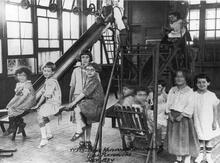Rachel Hays Sulzberger
Rachel Hays Sulzberger maintained an active volunteer career in public service, in both Jewish and secular organizations. She is best remembered, however, as the second president of the New York section of the National Council of Jewish Women (NCJW), from 1894 to 1900. As section president, Sulzberger was a strong proponent of the NCJW as a moral and spiritual force in America’s big cities. Both within and beyond the National Council of Jewish Women, Sulzberger invested her time as well as her money in volunteer activities. As NCJW president, she founded the Recreation Rooms and Settlement, popularly known as “The House on Christie Street,” and served as its president for 25 years following its independence from NCJW. She remained on the board until she died.
Article
Rachel Hays Sulzberger maintained an active volunteer career in public service, in both Jewish and secular organizations. She is best remembered, however, as the second president of the New York section of the National Council of Jewish Women (NCJW), from 1894 to 1900. As section president, Sulzberger was a strong proponent of the NCJW as a moral and spiritual force in America’s big cities.
Rachel Hays Sulzberger was born in 1861 in New York City, the daughter of David Hays and Judith Piexotto Hays. Her father was a descendant of Jacob Hays, one of the founders of Shearith Israel, the first organized Jewish congregation in America. Her mother was descended from the Piexottos, one of the oldest American Sephardi Jewish families. Rachel Hays was educated in New York City and graduated from the Normal College Training School (now Hunter College). Prior to her marriage, she taught for four years, both at the Normal College and in the public schools. In 1884, Rachel Hays married Cyrus L. Sulzberger. Their children included Arthur Hays Sulzberger, who became the publisher of The New York Times.
In a speech at the national convention in 1896, she proclaimed that the NCJW’s greatest success was not its vast charitable works, but that the organization had “quickened the religious feeling of the community” through the influence of the religiously inspired women of the NCJW within their homes. She also justified the leisure-time activity of the Bible circles as a means of spiritual elevation for the Jewish woman. Despite this emphasis on a woman’s home-bound moral influence, Sulzberger also exhorted the NCJW members to take up outside volunteer work and even recommended that every member who was not already thus engaged and “whose home duties permit” be required to do volunteer work for a few hours a month.
Both within and beyond the National Council of Jewish Women, Sulzberger herself invested her time as well as her money in volunteer activities. As NCJW president, she founded the Recreation Rooms and Settlement, popularly known as “The House on Christie Street,” and served as its president for 25 years following its independence from NCJW. She remained on the board until she died.
Beyond the NCJW, Rachel Hays Sulzberger was the vice president of the United Neighborhood Houses, an association of settlement houses, and chaired its Parks Anti-Litter Committee, formed at her suggestion. As committee chair, she worked in cooperation with the mayor for the installation of trash receptacles in New York City’s public parks. She was also the first woman trustee of the Aguilar Library Association, which was later part of the New York Public Library System, as well as a member of the New York Urban League and founder and honorary director of the Jewish Working Girls Vacation Society. She was a member of the Daughters of the American Revolution as well.
Rachel Hays Sulzberger died on February 10, 1938.
AJYB 7 (1905–1906): 107, 40:392.
Birmingham, Stephen. The Grandees: America’s Sephardic Elite (1971).
Dryfoos, Susan W. Iphigene: Memoirs of Iphigene Ochs Sulzberger of The New York Times Family, as Told to Her Granddaughter, Susan W. Dryfoos (1991).
“Mrs. Sulzberger Dies at Her Home.” NYTimes, February 11, 1938, 23:3.
National Council of Jewish Women. Proceedings of the National Council of Jewish Women, 1896 (1896).
Rogow, Faith. Gone to Another Meeting: The National Council of Jewish Women, 1893–1993 (1993).



